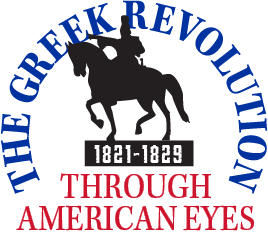I. Aspects of American Philhellenism:
Edward Everett, Thomas Jefferson and Adamantios Korais; Albert Gallatin and The Marquis de Lafayette
D. A Letter from Everett to Korais
(Stratakis, pp. 164-66.) September 11, 1825
Dear Sir and Friend,
Upon the start of the Greek Revolution I received the proclamation of the Messenian Senate of Calamata in Greek and French, addressed to the citizens of the United States of America, with a letter to myself, also in both languages, signed by you, Sir, together with some of your compatriots.
I translated them into English; I had them printed and circulated in our best magazines. In the month of October, 1823, in the magazine North American Review of which I was then editor, I gave a lengthy note of your edition of the Ethics and the Politics of Aristotle. In that note I incorporated a translation of the Greek Constitution of Epidaurus of 1822. With the original of the proclamation of the Senate of Calamata and of your letter to me I accompanied it all with the strongest call which I could to the sympathy of the Americans. I would not want to attribute to my slight efforts but to the jus, tice and truth of our Cause that a deep universal and generous feeling for Greece spread throughout North America. Philhellenic committees were formed everywhere and rather substantial amounts of money were given. Soon by worthy friend Mr. Webster, the most outstanding member of the Congress of the United States of America, made the proposal that measure be taken immediately for the Recognition of the Independence of Greece. He asked me to let him have a sketch of the Revolution during the three years of its duration, and then with a statistical overview of the territory and the means of Greece which I did as best I could. His proposal was supported by him and by other members of the Congress with rare eloquence, but it failed. I believe nevertheless that if Greece succeeds in the military campaign of 1825;and the Greek government decides to send an authorized commissioner to America, someone who speaks English or at least French, he could help a great deal in obtaining Recognition. As at present I myself have the honor of being a member of the Congress, I do not need to say that I will not fail to support any measure the purpose of which is the good fortune of Greece
In addition to approximately 40,000 Spanish ecus (collonated[sic]) which have been sent from America to Greece, several young people have gone there. Four have received the assistance of the Philhellenic Committee of Boston of which I have the honor of being the Secretary. Twice I have received letters from Prince Mavrocordatos, in reply to my letters which were brought by these young people. One of them, Dr. Howe, is making himself very useful, in addition to what he sends me, as a surgeon.
You would be doing me a great favor, Sir, by being so good as to place yourself in communication with me on the subject of Greece. Next after the personal services of a Greek Commissioner in America, the most useful thing would be to receive true information, at an early time. If you do me the honor of writing me, write me, I beg of you, in modern Greek; I read it (particularly when you write it) very easily although I have lost the habit of writing it. I wish you the enjoyment of your venerable age. Permit your eyes to see a free and happy Greece.
Signed: Edward Everett
From the month of December until May, I will be in Washington. Address c/o Wells & Co. 26 Rue de Faubourg Peponniere, Paris
(Hatzidimitriou 37-38)
Source: Constantine G. Hatzidimitriou, Founded on Freedom and Virtue: Documents Illustrating the Impact in the United States of the Greek War of Independence, 1821-1829 (New Rochelle, New York: Aristide D. Caratzas, 2002).
